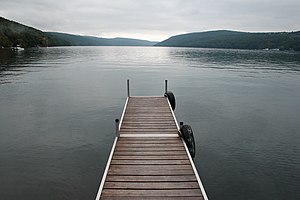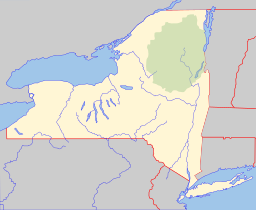Skaneateles Lake
| Skaneateles Lake | |
|---|---|
 | |
| Location | Onondaga / Cayuga / Cortland counties, New York, United States |
| Group | Finger Lakes |
| Coordinates | 42°51′45″N 76°22′22″W / 42.86250°N 76.37278°W |
| Type | Ground moraine |
| Primary outflows | Skaneateles Creek |
| Basin countries | United States |
| Max. length | 16 miles (26 km) |
| Max. width | 1.5 miles (2.4 km) (at Edgewater Park) |
| Surface area | 8,800 acres (3,600 ha) |
| Average depth | 148 ft (45 m) |
| Max. depth | 315 ft (96 m) |
| Water volume | 0.385 cu mi (1.60 km3) |
| Residence time | 18 years |
| Surface elevation | 863.27 ft (263.12 m) |
| Settlements | Skaneateles, New York |
Skaneateles Lake (/ˌskæniˈætləs/ SKAN-ee-AT-ləs, locally /ˌskɪn-/ SKIN-)[1] is one of the Finger Lakes in central New York in the United States. The name Skaneateles means long lake in one of the local Iroquoian languages. The lake is sometimes referred to as "The Roof Garden of the Lakes" because its altitude (863.27 ft or 263.12 m) is higher than the other Finger Lakes.[2] It is one of the cleanest lakes in the United States.
It is 16 mi (26 km) long (17 mi or 27 km long including the bogs at the south end of the lake) and on average 0.75 mi (1.21 km) wide, with a surface area of 13.6 sq mi (35 km2), and a maximum depth of 315 ft (96 m). The lake drains north via Skaneateles Creek, which flows into the Seneca River.
The cleanest of the Finger Lakes, its water is so pure that the city of Syracuse and other municipalities use it unfiltered.[3] The City of Syracuse spends about $2.3 million a year to protect lake quality, sixteen people inspecting (usually twice a year) each of the 2600 properties in the watershed, which is relatively small, compared to other Finger Lakes. The lake is the second cleanest lake in the United States as measured by dissolved nitrogen, after Crater Lake in Oregon.
William Henry Seward called it "The most beautiful body of water in the world."[4][5]
Description
[edit]
The shores of Skaneateles Lake are in three counties: Onondaga, Cayuga, and Cortland. The village of Skaneateles (population about 2,450) is at the northern end of the lake, in Onondaga County. Summer cottages appeared in 1881, increasing to more than 2000 residences around the lake in 2002. Generally new homes now are built for year-round occupancy rather than summer use and many summer cottages are replaced. The transient and seasonal population of this tourist destination and summer resort surges during the warmer months.

Skaneateles Lake is separated from two other nearby Finger Lakes, Otisco and Owasco, by ridges some 600 feet above the waters, affording magnificent prospects on both sides. Much of the highland terrain is forested, with several large public preserves. Once more cultivated, this region was known for the teasel industry until 1930. Teasels were employed commercially by woolen mills to raise the nap on the material. Although some dairy farms remain in the highlands, occasionally remaining in the same family after many generations, much of the land no longer serves agriculture. There is some experimention with introduction of vineyards, which have proved so successful on the more western Finger Lakes. Skaneateles Lake, however, at elevation 863 feet, may offer a less salubrious microclimate than larger, deeper and lower lakes, like Cayuga Lake, at elevation 382 feet.
Landmarks and features
[edit]
Landmarks and scenic features appear around the lake. Many historic buildings enhance the village of Skaneateles. Carpenter Falls are near the hamlet of New Hope about one mile inland from the southwest shore of the Lake. The hike down to the main waterfall from the road above is on an unimproved cliff face and quite dangerous. The falls are part of the Bahar Nature Preserve that extends along Bear Swamp Creek to the lake.[6] The historic New Hope Mill (closed to public permanently) is nearby. Opposite Carpenter Point is Ten Mile Point, a favorite picnic destination. The southern end of the lake, bounded by high hills (below, right) differs in character from the north. Glen Haven, a hamlet located there, once featured a large resort hotel but now offers smaller visitor accommodations and seasonal dining. From 1860-1900, Dr. W. C. Thomas offered a water cure treatment at the Hotel Glen Haven.[7] On the west side, the high Town of Niles, New York provides scenic prospects. On the east side, the high Town of Spafford offers panoramic views. Between these towns lies deep Glen Haven valley in the Town of Scott, New York, in the third county. The hamlet of Borodino in Spafford retains an 1830 church, little altered, in the Federal style and noted as a center of the abolitionist movement where Frederick Douglass spoke.
The lake has long been popular for recreational sailing. Regattas with yachts from other lakes as well as Skaneateles began in 1847. The Skaneateles Country Club now has a boating center. The Lightning, a racing dinghy, was designed and produced in Skaneateles, as was the Comet. There are few marinas or other commercial facilities on the lake shore. There is a New York state public boat launch site on the lake's west side just south of the Skaneateles Country Club marina. Also, on the west side of the lake, about 6 miles south of the Skaneateles Country Club Marina, in the hamlet Mandana, lies the Skaneateles Marina. The town of Spafford has a public boat launch near Borodino on the east side of the lake about four miles south of the Skaneateles Sailing Club. Glen Haven, at the head of the lake (The Finger Lakes flow South to North), offers a marina and docking. Cruises are available from the village. A mailboat serving cottages along the lake also carries passengers.
Wildlife
[edit]In its 2012 Angler Diary, the New York State Department of Environmental Conservation cites thirteen species of fish that live in Skaneateles Lake. These species include: rainbow trout, lake trout, lake whitefish, landlocked salmon, smallmouth bass, cisco, rock bass, chain pickerel, pumpkinseed, yellow perch, brown bullhead, bluegill, and common carp. The lake trout are naturally reproducing, while 20,000 rainbow trout and 9,000 landlocked salmon are stocked annually.[8]
A large die-off of bass in the spring of 2007 was later confirmed to be due to viral hemorrhagic septicema (VHS), a virus-caused fish disease that has killed millions of fish in the Great Lakes since its presence was noticed in the region in 2005.[9] This is the second of the Finger Lakes found to be contaminated with the virus, after its presence was detected in the westernmost of the Finger Lakes, Conesus Lake, in 2006.[10] The virus and disease are not a threat to human health, but the state of New York is working to slow its spread to other lakes. New state bait regulations were announced on June 6, 2007, aimed at curbing the spread of VHS.[11] VHS can be spread between bodies of water through live or frozen bait fish, roe, live wells, and ballast water, among other ways. Boats and fishing equipment should be disinfected before transfer from Skaneateles Lake to other bodies of water.
Environmental issues
[edit]
According to the United States Environmental Protection Agency, the lake is affected by pollution from agriculture sources (pesticide and fertilizer use, manure production, and sedimentation), residential sources (septic systems, lawn care, and construction), and streambank erosion.[12] Contaminants from these sources include sediment, nitrogen- and phosphorus-based nutrients, pesticides, bacteria (including fecal coliform), viruses, and protozoa such as giardia and cryptosporidium. The lake has an unusually low watershed-to-lake ratio, and is considered oligotrophic, meaning it is low in nutrients such as nitrogen and phosphorus.[12][13] The water is clear and low in vegetation. However, the water clarity quality has reduced in recent years because of massive algal bloom outbreaks.[13]
A stiff, sticky foam on the lake was reported in 2013 to have been visibly increasing for years. The foam accumulates on shorelines and in bays after strong winds.[14] According to the Skaneateles Lake Association, a preliminary analysis indicated the source of the foam was anionic surfactants released during the natural breakdown of organic matter.[14] The phenomenon was reported on other nearby lakes as well.[14]
In 2017, the lake experienced a widespread blue-green algal bloom which tested positive for microcystin toxins, thus no longer making it one of the cleanest lakes in the US.[15]
See also
[edit]References
[edit]Notes
- ^ Kenyon, John S.; Knott, Thomas A. (1953). A Pronouncing Dictionary of American English. Springfield, Mass.: Merriam-Webster. p. 393. ISBN 0-87779-047-7.
- ^ iFingerLakes.com
- ^ Halfman, John (2016-12-31). "WATER QUALITY OF THE EIGHT EASTERN FINGER LAKES, NEW YORK: 2005 – 2016" (PDF).
- ^ N/A, N/A (2009-09-20). "William Seward on Skaneateles Lake". kihm6.wordpress.com. “kihm”. Retrieved 2020-04-21.
- ^ Monfiletto, Jonathan (2015-03-17). "'Smiling village': Sherwood Inn plaque reveals William Henry Seward's love for Skaneateles". auburnpub.com. N/A. Retrieved 2020-04-21.
- ^ The nature preserve includes the Carpenter Falls Unique Area owned by New York State and the Bahar Nature Preserve that is held by the Finger Lakes Land Trust. See "Bahar Preserve and Carpenter's Falls". Finger Lakes Land Trust. Retrieved 2016-07-10.
- ^ "DrThomas". cdm16694.contentdm.oclc.org. Retrieved 2021-05-26.
- ^ "Skaneateles Lake". New York State Department of Environmental Conservation. Retrieved 2014-02-26.
- ^ Figura, Dave (2007-07-14). "Federal lab confirms VHS caused fish kill". The Post-Standard. Archived from the original on 2007-10-12. Retrieved 2007-07-15.
- ^ Crawford, Franklin (2007-05-17). "Cornell researchers confirm that deadly fish virus has spread to 19 species, threatening sport-fishing industry". Chronicle Online. Cornell University. Retrieved 2007-07-14.
- ^ "Fish Health Regulations in Response to VHS". Department of Environmental Conservation. New York State Department of Environmental Conservation. 2007-06-15. Archived from the original on 2007-07-04.
- ^ a b "Skaneateles Lake". U.S. Environmental Protection Agency. Archived from the original on 2013-03-13. Retrieved 2014-02-23.
- ^ a b Black, Peter E.; Fisher, Brian L. (16 December 2009). Conservation of Water and Related Land Resources, Third Edition. CRC Press. p. 242. ISBN 978-1-4398-6320-6.
- ^ a b c Werner, Bob (2013-10-22). "SLA learns more about foam in Skaneateles Lake". Skaneateles Press. Archived from the original on 2014-03-02. Retrieved 2014-02-27.
- ^ "'High toxins' confirmed in Skaneateles Lake algae bloom". 17 September 2017.
This article includes a list of general references, but it lacks sufficient corresponding inline citations. (May 2010) |
Bibliography
- Beauchamp, William M. Indian Names in New York. Fayetteville, NY: Recorder Office, 1893
- Tobin, Dave (2006-12-24). "A watertight watershed". Post-Standard.[dead link]
- Sage, Samuel H. "Skaneateles Lake," Encyclopedia of New York State. Syracuse University Press, 2005.
- Woodcock, Sue Ellen. Skaneateles. Arcadia-Images of America. 2001
- "Morphometry of Skaneateles Lake". Central New York Ecology and Economy (blog). 2003-08-21. Archived from the original on 2004-09-03.
- "Lake Skaneateles". Water on the Web.
External links
[edit]- Spectacular Spafford
- Lake photos and area information
- Skaneateles Sailing Club
- Public Boat Launching Sites - Onondaga County
- Carpenter Falls photos and information
- Carpenter Falls
- Borodino Church, Underground Railroad
- Spaulding House, Underground Railroad
- The Glen Haven Hotel, Restaurant and Marina - At The South End of Paradise


